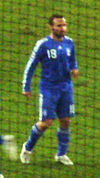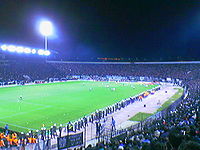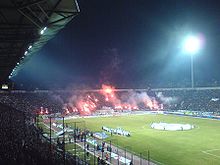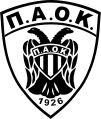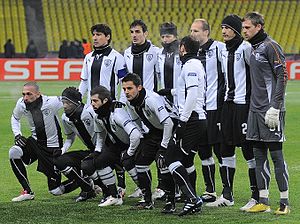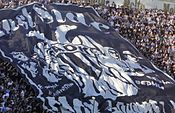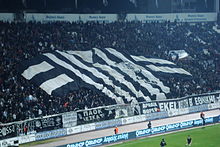- P.A.O.K. F.C.
-
P.A.O.K. 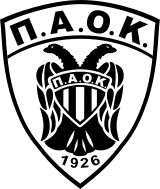
Full name Panthessaloníkios Athlitikós Ómilos Kostantinopolitón
(Pan-Thessalonian Athletic Club of Constantinopolitans)
(Greek: Πανθεσσαλονίκειος Αθλητικός Όμιλος Κωνσταντινουπολιτών)Nickname(s) Dikefalos tou Vorra (Doublehead eagle of the North ) Founded 1926 Ground Toumba Stadium
(Capacity: 28,703[1])Chairman Theodoros Zagorakis Manager László Bölöni League Super League Greece 2010–11 3rd[2][3][4] Website Club home page Home coloursAway coloursThird colours Current season
Current seasonP.A.O.K. F.C. (Greek: Πανθεσσαλονίκειος Αθλητικός Όμιλος Κωνσταντινουπολιτών – Panthessaloníkios Athlitikós Ómilos Konstantinoupolitón, the Pan-Thessalonian Athletic Club of Constantinopolitans) is a Greek association football club based in Thessaloniki, Greece. It is the largest supported football club in Macedonia.
PAOK FC is the football department of Pan-Thessalonian Athletic Club of Constantinopolitans (PAOK), a multi-sport club. Since its formation in 1926 the football club has played in the top division of Greek football and has never been relegated. PAOK FC have been Greek football champions twice, runners-up three times, and have won the Greek Cup four times, as well as being runners-up a record 12 times. The team's colours are black and white, and since 1959 they have played their home games at Toumba Stadium.
History
Foundation
PAOK FC is the oldest division of PAOK Sports Club, the succession of Hermes Sports Club (Greek: Ερμής), which was formed in 1875 by the Greek community of Pera, a district of Istanbul.[5] The sports club established itself in the first few years of the 20th century, proving that although the Greeks were a minority they could boast a strong presence in the sporting sector.
That situation, however, came to an abrupt end after the Asia Minor Catastrophe, when most players were forced to emigrate to Greece due to the population exchanges. Left behind was a club consisting of the residents that remained (later called Politakia). Those who fled settled in Thessaloniki and established PAOK in 1926.
The club's first charter was approved on 20 April 1926 by means of decision of the Thessaloniki Court of First Instance (No. 822). PAOK's first emblem, adopted in 1926 was a four-leaved clover and a horseshoe. The leaves were green with the letters PAOK marked on each of them, a symbol devised by Kostas Koemtzopoulos (president of Pera Club).
The club's founding members were:
T. Triantafyllidis (1st Chairman), Xasan Kioprulu (2nd Chairman), A. Angelopoulos(3rd Chairman), A. Athanasiadis, K. Anagnostidis, M. Ventourellis, A. Dimitriadis, D. Dimitriadis, N. Zoumboulidis, M. Theodosiadis, T. Ioakimopoulos, P. Kalpaktsoglou, T. Kartsambekis, D. Koemtzopoulos, K. Koemtzopoulos, P. Kontopoulos, K. Kritikos, M. Konstantinidis, P. Maletskas, I. Nikolaidis, L. Papadopoulos,F. Gamospitos, F. Samantzopoulos, T. Tsoulkas, M. Tsoulkas, S. Triantafyllidis
1926–1953 – The early years
After two months of preparation by the team following the club's establishment, it was decided that the team should compete against the other teams in Thessaloniki. The first match of the club was a win against Iraklis on 26 July 1925 by 2–1. Two weeks later, PAOK lost 5–2 to Aris.
The vision of the club's founders and the whole PAOK community of establishing a home ground became reality in 1928 following much effort and thus on December 12, 1930 the Syntrivaniou Football Ground was officially opened. This was followed by a friendly match against Aris with PAOK winning 2–1.
The first professional contract was a document of historic importance. It was signed by the Club on 5 September 1928. The contract stipulated that the footballer Etienne from Peraclub would be paid 4,000 drachmas per month. The contract was signed by Dr. Meletiou (PAOK Chairman) and Mr. Sakellaropoulos, Hon. Secretary.
Following the merger with AEK Thessaloniki in 1929, PAOK changed its emblem. The new emblem became the double-headed eagle, which it remains to this day, indicating the heritage of the refugees (Constantinople). The difference between the PAOK eagle and the Byzantine eagle is that PAOK's emblem has its wings folded and the colors are black and white, signifying mourning for expulsion from the homeland.
The first foreign coach in the history of the team was the German Rudolph Ganser, who served with PAOK for the 1931–32 season.
Following World War II and the German occupation of Greece, the team known as the "Two-Headed Eagle" entered upon a shining chapter in its career starting at the beginning of the 1950s. Willi Sevcik, an Austrian coach (1950–1952) who had worn the PAOK jersey in 1931–32, established a young talent academy within the club which gave rise to leading names who later left their mark, such as Leandros, Symeonidis, Giannelos, Margaritis, Giorgos Havanidis, and others.
1953–1970 – Recognition
1953 marked the beginning of PAOK's golden age. During the summer transfer period, Kouiroukidis, Petridis, Progios, Geroudis, Kermanidis, Hourvouliadis, Hasiotis and Angelidis all joined the club. PAOK became all-powerful, winning the Thessaloniki championship for three successive years and becoming a worthy representative of Greece's second city in the "national" championship.
In 1957, the club managers envisioned a new football ground since the old ground had been annexed by the state. The choice was a piece of land belonging to the National Defence Fund in the Toumba District, which was also a neighbourhood closely associated with refugees from Asia Minor. A total area of 30,000 x2 was acquired by PAOK for a significant price, and construction of the new football ground began. Lottery tickets were even issued to aid construction of the new stadium, which was eventually opened on 6 September 1959 by the Minister of National Defence, Mr. G. Themelis. Before the first kick-off, an Air Force plane dropped a ball on a fly-past as a symbolic donation from the armed forces. Thanks to its new Ground, PAOK was ready to start a brilliant career starting with the new First Division established in 1959.
At the opening of the 1st Division's first championship on 25 October 1959, PAOK welcomed the Katerini team Megas Alexandros, beating them 3–1. The team line-up was as follows: Zarko Mihailović (Serbian) and Progios, Hasiotis, Raptopoulos, Giannelos, Kemanidis, Havanidis, Leandros, Kiourtzis, Kouiroukidis, Salousto and Nikolaidis.
The success of the 1950s was followed by a decade of average performance during the 60's. One could say that it was as if the club was building up its strength to unleash it during the next decade.
1970–1985 – The golden years
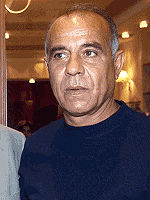 Giorgos Koudas is one of the most important players for PAOK's history.
Giorgos Koudas is one of the most important players for PAOK's history.
The team became established as one of the best ever to play at Greek football grounds with players whose names became legendary for the Greek football. It was a team which set several records, led by president Giorgos Pantelakis.
PAOK managed to strike a blow to the football powers of Athens, winning the Championship in 1976, preceded by triumphs in the Cup, in 1972 and 1974. 1976 also marked the foundation of Gate 4, PAOK's greatest organized fanbase.
Up to 1974, while Greece was governed by a military junta, PAOK had not only a football power, but also an anti-dictatorship symbol of sorts, and Toumba stadium became a harbor of fan anti-junta slogans
The Late Great Les Shannon who once played for high ranking English clubs such as Liverpool and Burnley was one the many causes for PAOK's success as he led them to win the Greek football cup in 1972 and 1974. He is still heralded as a Football Hero in Greek Football today.
PAOK's excellent performance continued during the early 1980s, with the club being one of the regular title contenders. The highest point came in 1985, when the club won its second Greek Championship, its first trophy since Greek football became professional. Another characteristic of the 1980s was the ever-growing fanaticism of the fans, which reached levels of hooliganism never seen before, and began to move beyond Greece's borders, spurring the creation of fanbases in cities all over Europe by the Greek diaspora. However, the obsession shown by fans also had its downside, translating in quite a few cases into outbreaks of violence which entailed penalties and fines being imposed on the club.
At the European level, the club made its best performance ever, qualifying for the quarter finals of the UEFA Cup Winners' Cup in 1973–74, where they were knocked out by the Italian team Milan. PAOK also made a memorable appearance against German giants Bayern Munich in the UEFA cup in 1983–84, where it was knocked out on penalties[6][7] after two goaless draws.
1985–1996 – The first decline
The 1990s started well, with PAOK firmly among the top three teams in Greece. It was stigmatized, however, by an extremely average-to-poor team performance under the chairmanship of Thomas Voulinos, who came into direct conflict with the fans following serious hooliganism episodes during a PAOK–Paris Saint-Germain match for the UEFA Cup, which led to PAOK's exclusion from UEFA European competitions for five years and very soon to financial ruin.
1996–2004 – Revitalization and return to trophies
In 1996, the change long demanded by PAOK fans came about. Voulinos handed over the reins of the club to Giorgos Batatoudis and an air of optimism was tangible everywhere in Thessaloniki. Numerous transfers of well-known players such as Percy Olivares, Zisis Vryzas, Spyros Marangos, Kostas Fratzeskos, and others took place under the new administration.
In 1997, having served its five-year ban, PAOK eventually qualified for the UEFA Cup with coach Angelos Anastasiadis, a legendary former PAOK player, on the bench. The club's reappearance at European level was marked by an astonishing elimination of legendary English club Arsenal. PAOK was eliminated on the next round by the then powerful Atlético Madrid.
However, the new team did not prove equally successful in the domestic league, again finishing fourth in 1997–1998 despite great optimism. The club's continuing inability to break the dominance of the "big three" in the league resulted in several changes in managers over the following three years. By the end of the 1997–1998 season Anastasiadis was sacked and Oleg Blokhin reprised his position as PAOK's manager after five years. Yet, unable to make any considerable improvements, Blokhin himself only stayed for a few months, and was again replaced by Anastasiadis in late 1998. He himself stayed only till February 1999, and was again replaced in favor of Arie Haan, who, like Blokhin, returned after a four-year gap. By December 1999, in fitting fashion, Haan was himself sacked, to be replaced by star coach Dušan Bajević.
PAOK was firmly established among the top teams in the Greek league, but once again growing financial problems and unstable administration by Batatoudis meant they still could not keep up with the three major league contenders of Athens. Nevertheless, Bajevic led the club to their first throphy in 16 years, winning an unforgettable Greek Cup final against Olympiacos in 2001, with an emphatic 2–4[8] score.
Angelos Anastasiadis was once again summoned, as Bajevic did not renew his contract in the summer of 2002. Anastasiadis led the club to another Cup triumph, the second in the three years. It was in the club's home ground in Toumba Stadium, that PAOK celebrated their fourth Greek Cup, defeating arch-rivals Aris FC 1–0.[9] Despite these triumphs, however, debts were continued to plague the club, and some successes in the UEFA Cup were short-lived.
2004–2007 – The second decline and near-destruction
In late summer of 2003, under great pressure from fans, Batatoudis handed his shares to businessmen Giannis Goumenos and Vassilis Pagonis. Goumenos also assumed the presidency, under the motto of a "temporary administration". This meant that his role would be to try to facilitate a possible deal with people willing to make the hefty investments required to save the club from its debts.
The 2003–04 season was an unexpected success – under the management of Anastasiadis, and although in accordance to a tight financial policy (in order to decrease the debts, leading many key players to leave as free agents for other clubs, including eventual champions Olympiacos), they managed to finish third and to secure participation in the qualifying rounds of the following year's UEFA Champions League. The prospect of the Champions League group stage brought great optimism to fans and management alike, especially because the projected income would practically eliminate all debts.
Unfortunately the team failed to qualify, as they were knocked out by unlikely opponents Maccabi Tel Aviv in the third qualifying round. The main reason was that in the home game, Anastasiadis fielded Liassos Louka, a Cypriot player who was still serving a two-match ban in UEFA competitions (for his sending-off in a UEFA Intertoto Cup tie while playing for Nea Salamis on 8 July 2000). Though the game did finish 1–2 for Maccabi, the 0–3 forfeit win awarded to the Israelis destroyed all hope PAOK had for a comeback, and the rematch lost all interest (4–0 aggregate loss). After the subsequent UEFA Cup elimination by AZ Alkmaar, Anastasiadis resigned. Thus, the 2004–2005 season started with the worst omens for the club and for Goumenos.
Instead of making any improvements, Goumenos' administration failed miserably in the next two years, as the club's debt to the Greek state (due to constant tax evasions, interests and unpaid fines) continued to grow, and on top of that, the financial management of the club itself was ever deteriorating.
Rolf Fringer was appointed as new coach in September 2004, replacing Anastasiadis, yet did not live up to expectaions, managing Anastasiadis' former roster which mostly consisted of youngsters. After a few games, Fringer was eventually replaced by Nikos Karageorgiou, leading the club to a fifth-place finish in May 2005, and a UEFA Cup qualification.
The 2005–2006 season started with better omens, yet proved to be the most turbulent.[10] Apart from the return of legendary former captain Theodoros Zagorakis in the summer of 2005 from Bologna FC, signings of key players like Marcin Mieciel, Fatih Akyel and Shikabala took place.[11] Despite this, another mediocre league start led Karageorgiou to be sacked as well, and replaced by former technical director Giorgos Kostikos. Kostikos did manage good performances in the autumn of 2005, including an unexpected away win at Olympiacos FC, and a thrilling qualification to the UEFA Cup group stages. However, after the winter break, the squad fared from bad to worse, suffering a handful of successive defeats, which led Kostikos to the exit as well, replaced by Ilie Dumitrescu. By now Goumenos had set a new record for the club, by laying off five different coaches in just 16 months. While the club did achieve UEFA cup qualification by finishing in sixth place, uncertainty was more than tangible.
By the end of May 2006, the club's dramatic situation started to emerge, with players openly declaring they are unpaid for months, plus a shock decision by UEFA to ban the club from participating in the upcoming UEFA Cup[12] brought the club one step from complete ruin, with the organized fanbase launching an all-out war on Goumenos in the June 2006,[13] going as far as to occupy the club's offices in Toumba stadium for a handful of days. The situation was ever worsening for Goumenos, after many failed deals with possible investors,[14] constant allegations of embezzlement,[15] and especially his decision to sell star player Dimitris Salpigidis to Panathinaikos,[16] in an effort to cash in. The latter had a profound impact, causing a lot of disgust in the already disappointed fans.
The 2006–2007 season started with PAOK unsure if they could even manage to participate in the Greek League, due to the pressing debts. Little-known players like Carlos Zegarra and Miguel Rebosio were signed, in an effort to fill the squad roster, and Dumitrescu settled with ultra-defensive tactics, as the means to earn what points he could – resulting in terrible quality football, tiring fans and rapidly diminishing ticket sales.
Eventually, Goumenos was forced to withdraw from the presidency in 13 November 2006 (though he would not relinquish his shares until over two years later).[17][18] He was replaced by Nikos Vezyrtzis and Apostolos Oikonomidis, former shareholders in PAOK BC. The new management was appointed under order of the District Court of Thessaloniki, as the club was now essentially under state observation, owing to the huge debt to the Greek state which by now was well over €30 million.
The club fared little better in remainder of the season. Managerial changes continued as ever – Momcilo Vukotic replaced Dumitrescu in October 2006,[19] only to be sacked himself five months later, in favor of Giorgos Paraschos. PAOK eventually finished the 2006–2007 season in 6th place, losing out on the UEFA Cup spots, and little hope of breaking its shackles, as the fans continued to put very little trust in the Vezyrtzis-Oikonomidis duo and the needed investments seemed highly unlikely.
2007–2010 – The Zagorakis renaissance and the "three-year plan"
In the summer of 2007, Theodoros Zagorakis assumed presidency of the club, replacing the Vezyrtzis-Oikonomidis administration and thus ushered in a new era. One of the new management's first actions was to lay down a three-year plan: the first year priority would be to take action the club's massive crippling debts, beginning in 2007–08, the second would be to qualify for the UEFA Cup again, and the third would be to become a major league title contender once again.
Yet because of the tremendous financial breakdown in the past four years, the club was left with a low quality roster and almost no prospect of any summer transfers. Yet, due to hope and trust of the traditional fanbase in the iconic figure of Zagorakis, the summer of 2007 saw an unprecedented rise in season ticket sales, toppling all previous club records, and bringing a much-needed influx of cash for the club. This allowed the transfers of seasoned – though relatively cheap, being free agents – players like Vassilis Lakis, Ifeanyi Udeze, and Glen Salmon, and also the return of veteran PAOK and Perugia striker Zisis Vryzas. Many older debts to former players and managers, could finally be paid off.
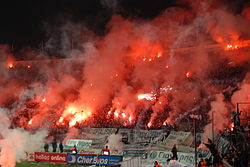 PAOK supporters during a match against Olympiacos in 2009.
PAOK supporters during a match against Olympiacos in 2009.
The plan's first season was still plagued by poor performances, including many home defeats and an elimination from the Greek Cup by second division club Thrasyvoulos. The early replacement of coach Giorgos Paraschos by established manager Fernando Santos did little to prevent a ninth place finish in the league, the worst performance by the club in 11 years. One of the few high points was the winter transfer of star player Sérgio Conceição.
The club's finances, however, gradually improved, and – thanks to the continuing massive support from fans in the form of season tickets,[20] as well as many new sponsorship deals – the summer of 2008 saw the transfers of widely known internationals like Pablo Contreras,[21] Zlatan Muslimović,[22] Pablo García[23] to the club, among others. Many of them were attributed to Zisis Vryzas, who had meanwhile decided to retire in January 2008 to assume the place of technical director for the club.
In January 2009, Zagorakis announced the club's intention of building a new training facility complex in Nea Mesimvria, Thessaloniki. The club had already acquired land from the municipality of Agios Athanasios in the previous summer,[24] and by February construction was already under way.
The end of the 2008–09 season found PAOK in second place, eight points behind champions Olympiacos, the best place the club had taken since 1985, and well above what was expected in the summer. This success, however was short-lived, as the club failed to retain their place in the recently erected league playoffs, finishing fourth and missing out on the second UEFA Champions League berth to Panathinaikos. Nevertheless, the club secured a spot in the 2009–10 UEFA Europa League third qualifying round.
Despite the League playoff failure, the 2009–10 season started with the best omens for the club, as once again the response to the summer sales of season tickets was enormous, despite the hefty increase in prices. Numerous transfers once again took place, including former Racing de Santander player Vitolo, experienced defender Bruno Cirillo, and star youngster Vasilios Koutsianikoulis, the club's costliest transfer in many years. Key players' contracts, like Olivier Sorlin and Vieirinha, were also renewed.
The new squad did not manage to live up to expectations immediately, suffering a painful (especially in financial terms) UEFA Cup elimination by Dutch club Heerenveen. To make matters worse, the first few games of 2009 found the club struggling in low positions. Despite that, the squad gradually started to climb to the first places, and starting on 5 December 2009, managed a 13-game unbeaten streak, including memorable wins against Panathinaikos and Olympiacos, solidifying the club as one of the main league title contenders. This run was not without setbacks, as the club suffered another shock elimination, this time from the Greek Cup, at the hands of recently promoted PAS Giannena.
The unbeaten streak ended in late March, when successive derby defeats by Aris and AEK, effectively ended any hope of winning the championship. However, the club redeemed itself in the league play-offs by finishing first, with impressive consecutive wins against Aris Thessaloniki F.C., AEK F.C. and twice against Olympiakos F.C.. Thus, PAOK was eligible to compete in the 2010–11 UEFA Champions League third qualifying round.
2010–2011 — The year after Fernando Santos
The three-year plan ended as a perceived success; PAOK was transformed from a miserable, rapidly collapsing club to a major championship contender once again, filling Toumba stadium on a regular basis, and having constantly positive finances, despite the burden of the still unsettled debt to the Greek state.
The 2010 league playoff success was swiftly followed by Fernando Santos' announcement of his decision to depart, having concluded his three-year contract.[25] It was eventually decided in mid-June that Mario Beretta would be his successor,[26] following negotiations with numerous other Italian managers by Zisis Vryzas.
The club's first – and much speculated – transfer was the return of prodigal son Dimitris Salpigidis for the next four years, whose contract with Panathinaikos F.C. had just expired on June. The first dumors initially caused some controversy among the organized fan base, though Salpigidis was eventually welcomed back by the vast majority of fans, very much in light of his huge potential as a striker.
PAOK – Panathinaikos. Another Toumpa tickets sold-out match
After withdrawing to the training facilities of Bad Brückenau in mid-July, the club was also drawn to face AFC Ajax in the third qualifying round.
As the squad made several awful appearances in its pre-season friendly matches (notably losing to Kickers Offenbach by 3–1[27]), alarming fans and management alike, Theodoros Zagorakis finally decided to fire Beretta and his staff on 22 July, just one week prior to the club's away match in Amsterdam. Beretta was quickly replaced with Pavlos Dermitzakis, veteran PAOK player and Zagorakis' initial choice before reverting to Beretta.[28] Beretta also became the shortest-lived PAOK coach ever, sitting on the bench for just 38 days.[29]
With Dermitzakis at the helm, PAOK faced Ajax and was ultimately eliminated on the away goals rule, managing a 1–1[30] draw in Amsterdam and a thrilling 3–3[31] draw in Thessaloniki. Entering the UEFA Europa League playoff round, PAOK were drawn against Turkish club Fenerbahçe, also eliminated on the Champions League third qualifying round. This time, PAOK fared much better and after winning the home game 1–0[32] in Thessaloniki, secured a memorable 1–1[33] draw in Istanbul after extra time, qualifying for the group stage, and being drawn to play alongside Villarreal CF, Club Brugge and Dinamo Zagreb.
Unfortunately, such excellent performances did not continue in the first fixtures of the Greek league. Unsuccessful results included a stinging 0–1[34] home loss to arch-rival Aris FC (the first home loss in twelve years), and although the European campaign was on track (with a draw against Brugge and a win against Dinamo Zagreb) many key players received harsh criticism from the fans, not as much for the bad results, as for their apparent lack of passion, which they showed against Ajax and Fenerbaçhe. Dermitzakis was not excluded from criticism, and was thought to be losing control over his players' discipline by engaging in personal conflicts.
Another hands-down defeat against Panathinaikos cemented the belief that the team cannot be improved under Dermitzakis, leading to his removal on October 17.[35] His assistant Makis Chavos replaced him as caretaker coach. At first fans were asking for a quick replace of Chavos by a European-range coach, but after a streak of four wins in the Greek Superleague and a home 1–0[36] win against Villarreal CF in the UEFA Europe League group stage, Chavos started to be considered as a useful solution as long as the team remained tranquil and was indeed signed as the permanent coach in mid-December.
PAOK ended their Europa League group stage campaign with an emphatic win 0–1[37] at GNK Dinamo Zagreb, qualifying second after Villarreal CF. They were later drawn to face PFC CSKA Moscow on the first knock-out round in February. The first game in Toumba ended 0–1[38] and, due to the 1–1[39] result in Moscow, PAOK was eliminated from the next phase of 2010–11 UEFA Champions League play-off round.
2011–Present
In the previous season, PAOK finished 4th in the regular season and secured a place in the 2011–12 UEFA Europa League third qualifing round by finishing 2nd in the playoff round. PAOK board appointed[40] the experienced Romanian coach László Bölöni.Under the leadership of Bölöni PAOK UEFA Europa League playoff round and enter the group stage once again despide the many injured players the club had.
Crest
PAOK's first emblem, adopted in 1926, was a four-leaved clover and a horseshoe. The leaves were green with the letters PAOK marked on each of them, a symbol devised by Kostas Koemtzopoulos (president of Pera Club).
In 1929, PAOK changed its emblem to the double-headed eagle(Greek: Δικέφαλος Αετός). The emblem, like that of AEK Athens F.C., symbolizes the club's historical links to Constantinople (Byzantine Empire),from where most of PAOK's original members and supporters migrated. The eagle depicted in PAOK's crest has always been displayed with wings folded, signifying mourning for lost homelands.
League performances – Alpha Ethniki and Super League
Season Pos. W. – D. – L. Goals Points Season Pos. W. – D. – L. Goals Points Season Pos. W. – D. – L. Goals Points Season Pos. W. – D. – L. Goals Points 1959–60 7 10 – 9 – 11 32–32 59 1976–77 321 – 10 – 3 63–27 52 1993–94 5 14 – 9 – 11 45–38 51 2010–11 314 – 6 – 10 32–29 48 1960–61 10 7 – 15 – 8 31–33 59 1977–78 216 – 14 – 4 48–24 46 1994–95 320 – 5 – 9 55–29 65 1961–62 6 12 – 6 – 12 32–43 60 1978–79 418 – 9 – 7 73–23 45 1995–96 14 10 – 11 – 13 42–46 38 (−3 p.) 1962–63 413 – 8 – 9 44–34 64 1979–80 5 17 – 7 – 10 53–33 41 1996–97 419 – 9 – 6 53–28 66 1963–64 8 10 – 7 – 13 22–30 56 (−1 p.) 1980–81 415 – 12 – 7 52–31 42 1997–98 421 – 7 – 6 74–41 70 1964–65 8 9 – 10 – 11 29–33 58 1981–82 318 – 10 – 6 55–22 46 1998–99 419 – 5 – 10 52–31 62 1965–66 6 10 – 9 – 11 43–49 59 1982–83 418 – 6 – 10 49–28 42 1999–00 5 15 – 10 – 9 64–44 55 1966–67 413 – 11 – 6 36–20 67 1983–84 5 11 – 13 – 6 33–29 45 2000–01 414 – 9 – 7 66–48 51 1967–68 9 13 – 7 – 14 45–40 67 1984–85 119 – 8 – 3 54–26 46 2001–02 414 – 6 – 6 55–45 48 1968–69 5 16 – 10 – 8 58–37 76 1985–86 10 10 – 7 – 13 33–38 27 2002–03 416 – 5 – 9 59–38 53 1969–70 5 12 – 17 – 5 52–25 75 1986–87 5 13 – 9 – 8 39–23 29 (−6 p.) 2003–04 318 – 6 – 6 47–27 60 1970–71 8 12 – 10 – 12 38–32 68 1987–88 317 – 5 – 8 60–27 39 2004–05 5 13 – 7 – 10 43–39 46 1971–72 5 18 – 10 – 6 53–27 80 1988–89 8 11 – 10 – 9 34–30 32 2005–06 6 13 – 7 – 10 44–31 46 1972–73 227 – 4 – 3 75–24 92 1989–90 319 – 8 – 7 49–26 46 2006–07 6 13 – 6 – 11 32–29 45 1973–74 416 – 11 – 7 62–32 43 1990–91 416 – 9 – 9 56–39 38 (−3 p.) 2007–08 9 10 – 5 – 15 29–35 35 1974–75 319 – 8 – 7 73–28 46 1991–92 413 – 13 – 8 44–44 39 2008–09 418 – 9 – 3 39–16 63 1975–76 121 – 7 – 2 60–17 49 1992–93 5 17 – 6 – 11 52–38 57 2009–10 219 – 5 – 6 41–16 62 1 The position may change after the end of the play-off mini-league.
- At 1986–87: had 3 nullified matches, resulting in −6 points.
- Point system: 1959–60 to 1972–73: 3–2–1. 1973–74 to 1991–92: 2–1–0. 1992–93 onwards: 3–1–0.
Most league appearances
Player Caps  Giorgos Koudas
Giorgos Koudas504  Kostas Iosifidis
Kostas Iosifidis397  Giannis Gounaris
Giannis Gounaris376  Stavros Sarafis
Stavros Sarafis358  Aristarchos Fountoukidis
Aristarchos Fountoukidis336 League top scorers
Player Goals  Stavros Sarafis
Stavros Sarafis136  Giorgos Koudas
Giorgos Koudas133  Giorgos Skartados
Giorgos Skartados84  Giorgos Kostikos
Giorgos Kostikos78  Neto Guerino
Neto Guerino66 UEFA competitions
PAOK F.C. in 2010-11 UEFA Europa League round of 32 match against PFC CSKA Moscow
PAOK has participated in every UEFA sanctioned competition except for the Champions League. On many occasions, mostly in the UEFA Cup and the UEFA Cup Winners' Cup, PAOK managed to eliminate famous European clubs, and the club's name was made known outside Greek borders as well. Also highlighted were the club's fanatically obsessed fans, massively following the club on every occasion.
PAOK's best Cup Winner's cup performance was in the 1973–74 season, when they reached the quarter-finals of the competition. Eliminating Legia Warsaw and Olympique Lyonnais on the way, PAOK were finally eliminated by Milan. After a 3–0 defeat at the San Siro, PAOK were held to a 2–2 draw at Toumba Stadium and knocked out.
PAOK's most successful UEFA Cup run was the 1997–98 season.PAOK qualified for the second round by beating Arsenal 2–1 on aggregate. They went on to lose 9–6 on aggregate to Atlético Madrid..
The most recent European-level achievement was the elimination of Turkish club Fenerbahçe in the 2010–11 UEFA Europa League playoff round, and the subsequent group stage success against Villareal CF, Dinamo Zagreb and Club Brugge. This campaign ended in Russia against CSKA Moscow, with PAOK however going down with no less than a hard fight.
- The club's biggest win in a European competition was 7–0 against Lokomotivi Tbilisi in 1999, while the heaviest defeat was 0–6 to Wiener SC in 1965.
- PAOK also holds the second place in the record for consecutive participations in the UEFA Cup, one behind Club Brugge. The club had participated in the UEFA Cup nine times in a row from 1997–98 up to 2005–06. PAOK missed the chance to tie with Brugge in 2006, as the club was banned by UEFA from taking part in the 2006–07 season of the UEFA Cup, despite having qualified, because of the club's long-unsettled debts.
European matches panorama
Season Competition Round Club Home Away 1965–66 Inter-Cities Fairs Cup 1st Round  Wiener SC
Wiener SC2–1 0–6 1967–68 Inter-Cities Fairs Cup 1st Round  Liège
Liège0–2 2–3 1970–71 Inter-Cities Fairs Cup 1st Round  Dinamo Bucureşti
Dinamo Bucureşti1–0 0–5 1972–73 Cup Winners' Cup 1st Round  Rapid Wien
Rapid Wien2–2 (a) 0–0 1973–74 Cup Winners' Cup 1st Round  Legia Warszawa
Legia Warszawa1–0 1–1 2nd Round  Lyon
Lyon4–0 3–3 Quarter-finals  Milan
Milan2–2 0–3 1974–75 Cup Winners' Cup 1st Round  Red Star Belgrade
Red Star Belgrade1–0 0–2 (aet) 1975–76 UEFA Cup 1st Round  Barcelona
Barcelona1–0 1–6 1976–77 European Cup 1st Round  Omonia
Omonia1–1 2–0 2nd Round  Dynamo Kyiv
Dynamo Kyiv0–2 0–4 1977–78 Cup Winners' Cup 1st Round  Zagłębie Sosnowiec
Zagłębie Sosnowiec2–0 2–0 2nd Round  Vejle
Vejle2–1 0–3 1978–79 Cup Winners' Cup 1st Round  Servette
Servette2–0 0–4 1981–82 Cup Winners' Cup 1st Round  Eintracht Frankfurt
Eintracht Frankfurt2–0 (4–5 p) 0–2 1982–83 UEFA Cup 1st Round  Sochaux
Sochaux1–0 1–2 (aet–a) 2nd Round  Sevilla
Sevilla2–0 0–4 1983–84 UEFA Cup 1st Round  Lokomotiv Plovdiv
Lokomotiv Plovdiv3–1 2–1 2nd Round  Bayern Munich
Bayern Munich0–0 0–0 (8–9 p) 1985–86 European Cup 1st Round  Verona
Verona1–2 1–3 1988–89 UEFA Cup 1st Round  Napoli
Napoli1–1 0–1 1990–91 UEFA Cup 1st Round  Sevilla
Sevilla0–0 (3–4 p) 0–0 1991–92 UEFA Cup 1st Round  KV Mechelen
KV Mechelen1–1 1–0 2nd Round  Swarovski Tirol
Swarovski Tirol0–2 0–2 1992–93 UEFA Cup 1st Round  Paris Saint-Germain
Paris Saint-Germain0–3 1 0–2 1997–98 UEFA Cup 2nd Qual. Round  Spartak Trnava
Spartak Trnava5–3 1–0 1st Round  Arsenal
Arsenal1–0 1–1 2nd Round  Atlético Madrid
Atlético Madrid4–4 2–5 1998–99 UEFA Cup 2nd Qual. Round  Rangers
Rangers0–0 0–2 1999–00 UEFA Cup 1st Round  Lokomotivi Tbilisi
Lokomotivi Tbilisi2–0 7–0 2nd Round  Benfica
Benfica1–2 2–1 (1–4 p) Season Competition Round Club Home Away 2000–01 UEFA Cup 1st Round  Beitar Jerusalem
Beitar Jerusalem3–1 3–3 2nd Round  Udinese
Udinese3–0 (aet) 0–1 3rd Round  PSV
PSV0–1 0–3 2001–02 UEFA Cup 1st Round  Kärnten
Kärnten4–0 0–0 2nd Round  Příbram
Příbram6–1 2–2 3rd Round  PSV
PSV3–2 1–4 2002–03 UEFA Cup 1st Round  Leixões
Leixões4–1 1–2 2nd Round  Grasshopper
Grasshopper2–1 1–1 3rd Round  Slavia Prague
Slavia Prague1–0 0–4 2003–04 UEFA Cup 1st Round  Lyn Oslo
Lyn Oslo0–1 3–0 2nd Round  Debrecen
Debrecen1–1 (a) 0–0 2004–05 Champions League 3rd Qual. Round  Maccabi Tel Aviv
Maccabi Tel Aviv0–3 2 0–1 UEFA Cup 1st Round  AZ
AZ2–3 1–2 2005–06 UEFA Cup 1st Round  Metalurh Donetsk
Metalurh Donetsk1–1 2–2 (a) Group Stage
(Group G) Shakhtar Donetsk
Shakhtar Donetsk0–1  Stuttgart
Stuttgart1–2  Rapid Bucureşti
Rapid Bucureşti0–1  Rennes
Rennes5–1 2009–10 Europa League 3rd Qual. Round  Vålerenga
Vålerenga0–1 2–1 (a) Play–Off Round  Heerenveen
Heerenveen1–1 (a) 0–0 2010–11 Champions League 3rd Qual. Round  Ajax
Ajax3–3 (a) 1–1 Europa League Play–Off Round  Fenerbahçe
Fenerbahçe1–0 1–1 (aet) Group Stage
(Group D) Club Brugge
Club Brugge1–1 1–1  Dinamo Zagreb
Dinamo Zagreb1–0 1-0  Villarreal
Villarreal1–0 0-1 Round of 32  CSKA Moscow
CSKA Moscow0–1 1–1 2011–12 Europa League 3rd Qual. Round  Vålerenga
Vålerenga3–0 2–0 Play–Off Round  Karpaty Lviv
Karpaty Lviv2–0 1–1 Group Stage
(Group A) Tottenham Hotspur
Tottenham Hotspur0–0  Rubin Kazan
Rubin Kazan2–2  Shamrock Rovers
Shamrock Rovers2–1 3-1 1: Match forfeited due to crowd invasion. Paris Saint-Germain were awarded a 3–0 win.
2: The first leg finished 2–1 to Maccabi Tel-Aviv but was awarded 3–0 against PAOK for fielding a suspended player.The European opponents by country
Supporters
Gate 4 is the largest PAOK supporters club. They generally support all clubs within the PAOK Sports Society, and mostly wear black and white symbols, which are the club's colors. The group as a whole traditionally maintains good relations with the Serbian FK Partizan football club supporters Grobari, as well as with the fans of OFI Crete.
Gate 4 members are known to be fanatic supporters of their team, frequently using numerous types of crackers and fireworks to create a supporting atmosphere for their team and also a hostile "welcome" to the opponent team.[41] The Toumba Stadium is infamous for its hostile atmosphere. These elements combine to allow the attribution of the Toumba Stadium as "Black Hell."
Club record in UEFA competitions
As of February 22, 2011. Official Stats from UEFA.[42]
Appearances in UEFA Champions League: 4
Appearances in UEFA Cup Winners' Cup: 6
Appearances in UEFA Europa League: 22
Biggest win in UEFA competitions: 16/09/1999,
 Lokomotivi Tbilisi 0–7 PAOK (Tbilisi)
Lokomotivi Tbilisi 0–7 PAOK (Tbilisi)Biggest defeat in UEFA competitions: 29/09/1965,
 Wiener SC 6–0 PAOK (Vienna)
Wiener SC 6–0 PAOK (Vienna)Players with most UEFA appearances: 33
 Dimitris Salpigidis
Dimitris SalpigidisMost goals scored in UEFA competitions: 11
 Dimitris Salpigidis
Dimitris SalpigidisUEFA club ranking
Current ranking
Rank Team Points 77  Steaua București
Steaua București24.664 78  AEK Athens
AEK Athens23.860 79  PAOK
PAOK23.360 80  Stoke City
Stoke City22.807 81  Racing Santander
Racing Santander22.351 Raking the last ten years
Season Rank Points Season Rank Points 2002–03  59
5944.391 2007–08  129
12916.525 2003–04  49
4941.467 2008–09  149
1499.633 2004–05  61
6135.715 2009–10  143
14311.479 2005–06  72
7233.587 2010–11  109
10917.333 2006–07  105
10523.415 2011–12  79
7923.360 Season 2011–12 in progress.
UEFA competition record
Team Statistics
[45] (As of November 3, 2011)
Competition Total App Pld W D L  UEFA Champions League
UEFA Champions League4 10 1 3 6  UEFA Europa League
UEFA Europa League19 84 32 26 26  UEFA Cup Winners' Cup
UEFA Cup Winners' Cup6 18 8 5 5  Inter-Cities Fairs Cup
Inter-Cities Fairs Cup3 6 2 0 4 Total 32 118 43 34 41 Player Statistics
Players with most European Appearances:[46]
(As of November 3, 2011)No Player Name Total Appearances 1.  Dimitris Salpingidis
Dimitris Salpingidis33 2.  Giorgos Koudas
Giorgos Koudas32 3.  Kostas Iosifidis
Kostas Iosifidis28 4.  Ifeanyi Udeze
Ifeanyi Udeze28 5.  Koulis Apostolidis
Koulis Apostolidis21 6.  Yiasoumis Yiasoumi
Yiasoumis Yiasoumi21 7.  Giannis Gounaris
Giannis Gounaris21 8.  Stavros Sarafis
Stavros Sarafis21 Most scoring players in European Competitions:[46]
(As of November 3, 2011)No Player Name Total Goals 1.  Dimitris Salpigidis
Dimitris Salpigidis11 2.  Yiasoumis Yiasoumi
Yiasoumis Yiasoumi9 3.  Stavros Sarafis
Stavros Sarafis8 4.  Vieirinha
Vieirinha7 5.  Kostas Frantzeskos
Kostas Frantzeskos6 Squad
Current Squad
Note: Flags indicate national team as has been defined under FIFA eligibility rules. Players may hold more than one non-FIFA nationality.
No. Position Player 1 
GK Kostas Chalkias 2 
DF Alexis Apostolopoulos 3 
DF Kostas Stafylidis 4 
DF Sotiris Balafas 5 
MF Pablo García 6 
MF Dimitris Stamou 7 
FW Giorgos Georgiadis 8 
DF Bruno Cirillo 9 
FW Dimitrios Salpigidis 10 
MF Juliano Spadacio 11 
MF Bertrand Robert 13 
DF Stelios Malezas 14 
FW Athanasios Papazoglou 15 
DF Pablo Contreras 16 
DF Alves Lino No. Position Player 18 
MF Giorgos Fotakis 20 
MF Vieirinha 21 
MF Vladimir Ivić 25 
MF Costin Lazăr 27 
DF Mirosław Sznaucner 28 
MF Stavros Tsoukalas 33 
FW Stefanos Athanasiadis 60 
DF Leonardo 71 
GK Panagiotis Glikos 77 
DF Etto 85 
MF Diego Arias 90 
DF Giorgos Katsikas 91 
GK Dario Krešić 99 
FW Apostolos Giannou For recent transfers, see List of Greek football transfers summer 2011
Professionals from U-20 Team
Note: Flags indicate national team as has been defined under FIFA eligibility rules. Players may hold more than one non-FIFA nationality.
No. Position Player 24 
DF Christos Intzidis 
DF Dimitris Kostantinidis 35 
MF Stelios Kitsiou 50 
MF Kostas Panagiotoudis No. Position Player 
MF Dimitris Popovic 
MF Kostas Dermitzoglou 
MF Christos Kostikidis 19 
FW Vasilis Papadopoulos Out on loan
Note: Flags indicate national team as has been defined under FIFA eligibility rules. Players may hold more than one non-FIFA nationality.
No. Position Player 30 
GK Fotis Koutzavasilis (on loan to Panserraikos F.C.) 22 
GK Asterios Giakoumis (on loan to Agrotikos Asteras F.C.) 
DF Panagiotis Kourdakis (on loan to Anagennisi Epanomi F.C.) 23 
DF Eleftherios Sakellariou (on loan to AO Kerkyra) 32 
DF Luka Petričević (on loan to Agrotikos Asteras F.C.) 
DF Aggelos Karantasiadis (on loan to Apollon Kalamarias F.C.) No. Position Player 26 
MF Ergys Kace (on loan to Anagennisi Epanomi F.C.) 
MF Giorgos Paralikis (on loan to Anagennisi Epanomi F.C.) 
MF Nikolaos Skempis (on loan to Apollon Kalamarias F.C.) 
MF Triantafyllos Savidis (on loan to Oikonomos Tsaritsani F.C.) 
MF Grigoris Efthimiadis (on loan to Makedonikos F.C.) 
FW Lazaros Moisiadis (on loan to Apollon Kalamarias F.C.) Affiliated clubs
Board of Directors and Managerial staff
Board of Directors[47]
Position Name President  Theodoros Zagorakis
Theodoros ZagorakisVice President & Technical Director  Zisis Vryzas
Zisis VryzasVice President & Greek Super League Representative  Bane Prelevic
Bane PrelevicVice President:  Panagiotis Pikilidis
Panagiotis PikilidisOrganisation Director  Panagiotis Pikilidis
Panagiotis PikilidisMember  Andreas Mandrinos
Andreas MandrinosMember  Spyros Milioridis
Spyros MilioridisMember  Giorgos Farlalis
Giorgos FarlalisMember  Panagiotis Raptopoulos
Panagiotis RaptopoulosMember  Athanasios Chatzopoulos
Athanasios ChatzopoulosManagerial Staff
Position Name Manager:  László Bölöni
László BölöniAssistant manager  Joaquim Preto
Joaquim PretoTechnical director  Pantelis Konstantinidis
Pantelis KonstantinidisGeneral manager:  Kostas Iosifidis
Kostas IosifidisScouter:  Antonis Lemonakis
Antonis LemonakisFitness Coach:  Nikos Karydas
Nikos KarydasFirst Team Coach:  Grigoris Kavalieratos
Grigoris KavalieratosGoalkeeper coach:  Stefanos Aivaliotis
Stefanos Aivaliotistranslator:  Kostas Lappas
Kostas LappasChief Medical Team:  Panagiotis Gigis
Panagiotis GigisGroup Doctor:  Ioannis Rallis
Ioannis Rallisphysiotherapist:  Nikos Tsirelas
Nikos TsirelasClothing Director:  Yasser Zeino
Yasser ZeinoTechnical Equipment Director:  Athanasios Sarapanis
Athanasios SarapanisHonours
Domestic
- Winners (4): 1971–72, 1973–74, 2000–01, 2002–03
- Runners-up (12): 1938–39, 1950–51, 1954–55, 1969–70, 1970–71, 1972–73, 1976–77, 1977–78, 1980–81, 1982–83, 1984–85, 1991–92
Regional
- EPSM Championship (local level until 1959)
- Winners (7): 1936–37, 1947–48, 1949–50, 1953–54, 1954–55, 1955–56, 1956–57
Continental
- Cup Winners' Cup
- Quarter-finals (1): 1973–74
International players
 Kostas Chalkias
Kostas Chalkias Dimitrios Salpigidis
Dimitrios Salpigidis Stelios Malezas
Stelios Malezas Giorgos Fotakis
Giorgos Fotakis
 Stefanos Athanasiadis
Stefanos Athanasiadis Giorgos Georgiadis
Giorgos Georgiadis Pablo Contreras
Pablo Contreras Costin Lazăr
Costin Lazăr
 Diego Arias
Diego Arias Vieirinha
Vieirinha Alexis Apostolopoulos (U-21)
Alexis Apostolopoulos (U-21) Giorgos Katsikas (U-21)
Giorgos Katsikas (U-21)
 Dimitris Stamou (U-21)
Dimitris Stamou (U-21) +*
+* Apostolos Giannou (U-21)
Apostolos Giannou (U-21)
Notable former players
 Angelos Anastasiadis (1973–1981)
Angelos Anastasiadis (1973–1981) Kostas Frantzeskos (1997–2000)
Kostas Frantzeskos (1997–2000) Georgios Georgiadis (1999–2003 & 2007–2008)
Georgios Georgiadis (1999–2003 & 2007–2008) Konstantinos Iosifidis (1971–1985)
Konstantinos Iosifidis (1971–1985) Pantelis Kafes (1997–2003)
Pantelis Kafes (1997–2003) Pantelis Konstantinidis (1998–2002 & 2005–2009)
Pantelis Konstantinidis (1998–2002 & 2005–2009) Giorgos Koudas (1958–1984)
Giorgos Koudas (1958–1984) Vassilis Lakis (2007–2009)
Vassilis Lakis (2007–2009) Spiros Marangos (1996–1998 & 1999–2000)
Spiros Marangos (1996–1998 & 1999–2000) Stavros Sarafis (1968–1981)
Stavros Sarafis (1968–1981) Giorgos Skartados (1982–1992)
Giorgos Skartados (1982–1992) Zisis Vryzas (1996–2000 & 2007–2008)
Zisis Vryzas (1996–2000 & 2007–2008) Thodoris Zagorakis (1993–1998 & 2005–2007)
Thodoris Zagorakis (1993–1998 & 2005–2007) Patricio Camps (2000)
Patricio Camps (2000) Ante Covic (1999–2001)
Ante Covic (1999–2001) Mladen Furtula (1975–1984)
Mladen Furtula (1975–1984) Zlatan Muslimovic (2008–2011)
Zlatan Muslimovic (2008–2011) Marcos António (2008–2009)
Marcos António (2008–2009) Neto Guerino (1974–1983)
Neto Guerino (1974–1983) Luciano de Souza (2001–2002)
Luciano de Souza (2001–2002) Guy Feutchine (2001–2006)
Guy Feutchine (2001–2006) Adolfo Valencia (1999–2000)
Adolfo Valencia (1999–2000) Panayiotis Engomitis (2000–2006)
Panayiotis Engomitis (2000–2006)
 Yiannakis Okkas (2000–2003)
Yiannakis Okkas (2000–2003) Yiasoumis Yiasoumi (2001–2007)
Yiasoumis Yiasoumi (2001–2007) Hossam Hassan (1990–1991)
Hossam Hassan (1990–1991) Ibrahim Hassan (1990–1991)
Ibrahim Hassan (1990–1991) Shikabala (2004–2006)
Shikabala (2004–2006) Magdy Tolba (1989–1993)
Magdy Tolba (1989–1993) Olivier Sorlin (2009–2010)
Olivier Sorlin (2009–2010) Ebenezer Hagan (2003–2004)
Ebenezer Hagan (2003–2004) Joe Nagbe (1997–2000)
Joe Nagbe (1997–2000) Nabil El Zhar (2010–2011)
Nabil El Zhar (2010–2011) Ifeanyi Udeze (2000–2002, 2003–2006 & 2007–2008)
Ifeanyi Udeze (2000–2002, 2003–2006 & 2007–2008) Percy Olivares (1997–1999)
Percy Olivares (1997–1999) Paul Cominges (1996–1998)
Paul Cominges (1996–1998) Miguel Rebosio (2006–2007)
Miguel Rebosio (2006–2007) Carlos Zegarra (2006–2007)
Carlos Zegarra (2006–2007) Marcin Mięciel (2005–2007)
Marcin Mięciel (2005–2007) Daniel Fernandes (2003–2008)
Daniel Fernandes (2003–2008) Sérgio Conceição (2007–2010)
Sérgio Conceição (2007–2010) Paul Bannon (1987–1988)
Paul Bannon (1987–1988) Omari Tetradze (1999–2001)
Omari Tetradze (1999–2001) Slobodan Krčmarević (1998–1999)
Slobodan Krčmarević (1998–1999) Goran Gavrancic (2007–2008)
Goran Gavrancic (2007–2008) Ivica Iliev (2007–2008)
Ivica Iliev (2007–2008) Vitolo (2009–2011)
Vitolo (2009–2011)
Managers
PAOK F.C. managers from 1970 onwards:[48]
1970–71  Ivica Horvat
Ivica Horvat
 Les Shannon
Les Shannon1971–72  Les Shannon
Les Shannon1972–73  Les Shannon
Les Shannon1973–74  Les Shannon
Les Shannon1974–75  Les Shannon
Les Shannon
 Apostolos Progios
Apostolos Progios
 Gyula Lóránt
Gyula Lóránt1975–76  Gyula Lóránt
Gyula Lóránt1976–77  Branko Stanković
Branko Stanković
 Billy Bingham
Billy Bingham1977–78  Billy Bingham
Billy Bingham
 Dimitris Kalogiannis
Dimitris Kalogiannis
 Lakis Petropoulos
Lakis Petropoulos1978–79  Egon Piechaczek
Egon Piechaczek1979–80  Egon Piechaczek
Egon Piechaczek
 Gyula Lóránt
Gyula Lóránt1980–81  Gyula Lóránt
Gyula Lóránt
 Aristarchos Fountoukidis
Aristarchos Fountoukidis1981–82  Heinz Höher
Heinz Höher1982–83  Heinz Höher
Heinz Höher1983–84  Pál Csernai
Pál Csernai1984–85  Walter Skocik
Walter Skocik1985–86  Walter Skocik
Walter Skocik
 Michalis Bellis
Michalis Bellis1986–87  Thijs Libregts
Thijs Libregts1987–88  Thijs Libregts
Thijs Libregts
 Michalis Bellis
Michalis Bellis1988–89  Rinus Israël
Rinus Israël
 Nikos Alefantos
Nikos Alefantos
 Stavros Sarafis
Stavros Sarafis1989–90  Rob Jacobs
Rob Jacobs1990–91  Rob Jacobs
Rob Jacobs
 Christos Terzanidis
Christos Terzanidis1991–92  Miroslav Blažević
Miroslav Blažević
 Giannis Gounaris
Giannis Gounaris1992–93  Ljupko Petrović
Ljupko Petrović
 Nikos Zalikas
Nikos Zalikas
 Oleg Blokhin
Oleg Blokhin1993–94  Oleg Blokhin
Oleg Blokhin
 Stavros Sarafis
Stavros Sarafis1994–95  Arie Haan
Arie Haan1995–96  Arie Haan
Arie Haan
 Stavros Sarafis
Stavros Sarafis
 Dragan Kokotovic
Dragan Kokotovic
 Michalis Bellis
Michalis Bellis
 Gunder Bengtsson
Gunder Bengtsson1996–97  Gunder Bengtsson
Gunder Bengtsson
 Christos Archontidis
Christos Archontidis
 Angelos Anastasiadis
Angelos Anastasiadis1997–98  Angelos Anastasiadis
Angelos Anastasiadis1998–99  Oleg Blokhin
Oleg Blokhin
 Angelos Anastasiadis
Angelos Anastasiadis
 Arie Haan
Arie Haan1999–00  Arie Haan
Arie Haan
 Stavros Sarafis
Stavros Sarafis
 Dušan Bajević
Dušan Bajević2000–01  Dušan Bajević
Dušan Bajević2001–02  Dušan Bajević
Dušan Bajević2002–03  Angelos Anastasiadis
Angelos Anastasiadis2003–04  Angelos Anastasiadis
Angelos Anastasiadis2004–05  Angelos Anastasiadis
Angelos Anastasiadis
 Rolf Fringer
Rolf Fringer
 Nikos Karageorgiou
Nikos Karageorgiou2005–06  Nikos Karageorgiou
Nikos Karageorgiou
 Giorgos Kostikos
Giorgos Kostikos
 Ilie Dumitrescu
Ilie Dumitrescu2006–07  Ilie Dumitrescu
Ilie Dumitrescu
 Momčilo Vukotić
Momčilo Vukotić
 Giorgos Paraschos
Giorgos Paraschos2007–08  Giorgos Paraschos
Giorgos Paraschos
 Fernando Santos
Fernando Santos2008–09  Fernando Santos
Fernando Santos2009–10  Fernando Santos
Fernando Santos2010–11  Mario Beretta
Mario Beretta
 Pavlos Dermitzakis
Pavlos Dermitzakis
 Makis Chavos
Makis Chavos2011–12  László Bölöni
László Bölöni- Fernando Santos is the longest serving manager (2 years and 10 months) and Mario Beretta is the shortest (38 days).[29]
- Angelos Anastasiadis is the overall longest serving manager (4 years an 2 months), in three distinct terms.
Retired numbers
Retired PAOK FC Numbers
- 12 – in honour of the fans, considered the "12th player" of the team in the pitch.
- 17 – in honour of Panagiotis Katsouris, a PAOK player that died in 1998 in a car accident.
Rivalries
Main article: Olympiacos and PAOK rivalryMain article: Aris and PAOK rivalry*
 (Aris F.C.)Main article: Double-headed eagles derbyMain article: PAOK and Iraklis rivalry
(Aris F.C.)Main article: Double-headed eagles derbyMain article: PAOK and Iraklis rivalry*
 (Iraklis F.C.)
(Iraklis F.C.)The rivalry between Olympiacos and PAOK, is long-standing, emerging in the 1960s, when the infamous case of Giorgos Koudas' transfer from PAOK to Olympiacos took place. The rivalry is mainly fueled by the corresponding rivalry that exists in many aspects between Athens and Thessaloniki.
A deep-seated hatred also exists between PAOK and local rivals Aris Thessaloniki, which has culminated in two memorable Greek Cup finals between them, each club winning one.On an annual basis, fierce derbies are contested for the Greek League, frequently accompanied by violent outbreaks on and off the pitch.
Panathinaikos and AEK Athens are also considered major rivals.
Facilities
Stadium
Name: Toumba Stadium[49]
Location: Toumba district, Thessaloniki, Greece
Year Built: 1959 (Last time rebuilt in 2004, due to the 2004 Summer Olympics, hosted in Greece, Athens.)
Capacity: 28,703 seats
Ownership: AS PAOK Thessaloniki
Used By: PAOK and PAOK Youth Team
Ioannis Dedeoglou who donated the land that the PAOK Sports Arena was built on has also offered to donate land next door to build a new Toumba of around 40,000 seats. However, PAOK's management has shown no interest and prefer to stick with the old Toumba.
Training Facilities
From June, 2008, PAOK has its own training facilities in the area of Nea Mesimvria, Thessaloniki. Those facilities cover over 70,000 square meters, have multisport purposes for all PAOK's athletes and among the others include:[24]
- 7 fields (3 for the First team, 3 for the U11,U15,U18 teams and 1 for the U21's matches.)
- Hosting area for the First and Reserves teams.
- Gym.
- Pool.
- Sauna.
- Rooms with projectors for tactical purposes.
- Press room.
- Changing rooms.
- Cafe and restaurant.
- Offices.
- Parking services.
Club anthem
PAOK's club anthem was written by Mimis Traiforos composed by Petros Giannakos, Kokovios, and sung by Petros Gkaronis.
Greek Phonetic Transliteration English Translation First stanza Σαν του ΠΑΟΚ την ομάδα
δεν υπάρχει στην Ελλάδα
ομαδάρα δοξασμένη
και με δάφνες στολισμένη
που τα έντεκα παιδιά μας
τα 'χουμε όλοι στην καρδιά μας.San tou PAOK tin omada,
Den iparchi stin Ellada,
omadara doksasmeni,
ke me dafnes stolismeni
pou ta endeka pedia mas
ta 'choume oli stin kardia mas.Like the team of PAOK,
there's no other in Greece
glorified team
with laurels decorated,
our eleven boys
we have them all in our heart.Chorus ΠΑΟΚ, ΠΑΟΚ τρέμουν τ' όνομά σου,
και στο πέρασμά σου τρέμει όλη η γη.
ΠΑΟΚ-ΠΑΟΚ άλλη τέτοια ομάδα,
σ' όλη την Ελλάδα δεν θα ξαναβγεί.PAOK, PAOK, tremoun t' onoma sou,
ke sto perasma sou tremi oli i gi.
PAOK, PAOK, alli tetia omada,
s'oli tin Ellada, den tha ksanavgi.PAOK, PAOK, (they) tremble your name
and on your going by, the Earth shakes.
PAOK, PAOK, another team like you,
in the whole of Greece, will never appear.Second stanza Ατσαλώνουν την ψυχή μας,
οι χιλιάδες οπαδοί μας,
γιατί τέτοια ενδεκάδα,
δεν υπάρχει στην Ελλάδα.
Πρώτοι θα ανακηρυχθούμε,
και στο μάτι θα τους μπούμε.Atsalonoun tin psichi mas,
i chiliades opadi mas,
giati tetia endekada,
den iparchi stin Ellada,
Proti tha anakirichthoume,
ke sto mati tha tous boume.(They) steel our souls,
our thousands fans,
because a squad like this,
there is no other in Greece,
we will make it to the top,
and become the other target.Chorus ΠΑΟΚ, ΠΑΟΚ τρέμουν τ' όνομά σου,
και στο πέρασμά σου τρέμει όλη η γη.
ΠΑΟΚ-ΠΑΟΚ άλλη τέτοια ομάδα,
σ' όλη την Ελλάδα δεν θα ξαναβγεί.PAOK, PAOK, tremoun t' onoma sou,
ke sto perasma sou tremi oli i gi.
PAOK, PAOK, alli tetia omada,
s'oli tin Ellada, den tha ksanavgi.PAOK, PAOK, (they) tremble your name
and on your going by, the Earth shakes.
PAOK, PAOK, another team like you,
in the whole of Greece, will never appear.Third stanza Είσαι η δόξα του Βορρά μας
το καμάρι κι η χαρά μας
κι όλοι οι αντίπαλοί μας
τρέμουνε την δύναμή μας
και γι αυτό θ'ακούνε Τούμπα
και θα κάνουν όλοι τούμπα.Ise i doksa tou Vorra mas,
to kamari ki i chara mas,
ki oloi oi andipali mas,
tremoune tin dinami mas
ke giauto tha akoune Toumba,
ketha kanoun oli toumba.You are the glory of our North,
our pride and joy,
and all our opponents,
tremble of our strength,
and when they hear "Toumba",
they all flip over.Shirt and Sponsors history
The shirt and sponsors history the last 40 years:
Season Kit manuf. Main shirt partner Season Kit manuf. Main shirt partner 1972–73 Umbro 1992–93 Diadora Nissan 1973–74 Umbro 1993–94 ABM 1974–75 Umbro 1994–95 ABM 1975–76 Adidas 1995–96 Puma Astir Insurance 1976–77 Adidas 1996–97 Puma Ethniki Insurance 1977–78 Umbro 1997–98 Adidas Geniki Bank 1978–79 Umbro 1998–99 Adidas Geniki Bank 1979–80 Umbro 1999–00 Adidas Geniki Bank 1980–81 Asics 2000–01 Adidas Geniki Bank 1981–82 Puma 2001–02 Adidas Geniki Bank 1982–83 Puma 2002–03 Adidas 1983–84 Puma Suzuki 2003–04 Adidas EKO Oil and Gas 1984–85 Puma Persica Carpets 2004–05 Adidas EKO Oil and Gas 1985–86 Asics Doperman Fashion 2005–06 Adidas Egnatia Insurance 1986–87 Asics Persica Carpets 2006–07 Puma 1987–88 Asics PRO-PO 2007–08 Puma DEPA 1988–89 Asics Coplam Building Prod. 2008–09 Puma DEPA 1989–90 Adidas Coplam Building Prod. 2009–10 Puma DEPA 1990–91 Adidas Agno Dairy Company 2010–11 Puma Pame Stoihima 1991–92 Diadora Agno Dairy Company 2011–12 Puma Pame Stoihima Season Tickets Sales
A large proportion of the revenue for PAOK comes from season ticket sales and they are often indicative of the support of the fanbase to the front office.
Season Ticket Sales[50]
Season Season Ticket Sales 1999–2000 6.275 2000–01 5.607 2001–02 2.989 2002–03 1.396 2003–04 2.917 2004–05 4.262 2005–06 8.278 2006–07 4.476 2007–08 12.259 2008–09 19.159 2009–10 21.100 2010–11 19.203 2011–12 N/A Total (Counting from 1999–2000)
109.721 See also
- PAOK (The Sports Club as a whole)
- PAOK B.C. (PAOK's Basketball Team)
- PAOK Thessaloniki V.C. (PAOK's Volleyball Team)
- Toumba Stadium (PAOK Football Stadium)
References
- ^ http://www.paokfc.gr/swift.jsp?CMCCode=100601&extLang=
- ^ Super League classification tables, showing in the playoffs classification table, that the results of play-offs change the overall classification of teams Super League Greece 2010–2011 results – http://www.superleaguegreece.net/
- ^ w:Super_League_Greece#Superleague_Greece_2011.E2.80.9312_members
- ^ Rules for the 2010–11 play-offs of Super League Greece stating that the playoff results do count to the overall league classification table: "Με την ολοκλήρωση των αγώνων, συντάσσεται νέα κατάταξη βάσει της οποίας η ομάδα με τη μεγαλύτερη συγκομιδή βαθμών καταλαμβάνει τη 2η θέση στο Πρωτάθλημα ΟΠΑΠ της “Super League Ελλάδα” και οι ομάδες που ακολουθούν καταλαμβάνουν αντίστοιχα, την 3η, 4η και 5η θέση στο Πρωτάθλημα ΟΠΑΠ της “Super League Ελλάδα”." – http://superleaguegreece.net/pedocs/Prokiriksi_Agonon_Katataksis_2010-2011.pdf
- ^ "History of PAOK". http://www.paokfc.gr/swift.jsp?CMCCode=100309&extLang=.
- ^ http://paoki.blogspot.com/2007/10/uefa-1983-1984-bayern.html
- ^ http://ethnikososiallistis.pblogs.gr/2010/08/megales-efrwpaikes-stigmes-mpagern-monahoy-paok-1983-84-0-0-9-8-.html
- ^ http://sports.in.gr/article/?aid=158270
- ^ http://www.epo.gr/index.php?option=com_content&view=article&id=1964&catid=78%3A2010-02-22-21-10-50&Itemid=294
- ^ http://sports.pathfinder.gr/football/a-national/paok/186834.html
- ^ http://news.pathfinder.gr/greece/politics/289639.html
- ^ http://www.in.gr/sports/article.asp?lngEntityID=711570&lngDtrID=246
- ^ http://www.tovima.gr/default.asp?pid=2&ct=5&artid=175225&dt=27/08/2006
- ^ http://archive.enet.gr/online/online_text/c=115,dt=26.11.2006
- ^ http://www.enet.gr/?i=news.el.article&id=69911
- ^ http://www.contra.gr/Soccer/Hellas/AEth/Panathinaikos/126837.html
- ^ http://www.in.gr/sports/article.asp?lngEntityID=754310&lngDtrID=246
- ^ http://news.pathfinder.gr/sports/356496.html
- ^ http://www.contra.gr/Stories/131651.html
- ^ http://www.contra.gr/Soccer/Hellas/Superleague/PAOK/211271.html
- ^ http://www.cosmo.gr/Music/Hellas/203890.html
- ^ http://sports.in.gr/football/superleague/article/?aid=922443
- ^ http://www.sport-fm.gr/article/143361
- ^ a b http://www.paokfc.gr/swift.jsp?CMCCode=100602&extLang=
- ^ http://www.contra.gr/Soccer/Hellas/Superleague/PAOK/273907.html
- ^ http://www.apn.gr/news/sports/o-mario-beretta-episima-proponitis-tou-paok/
- ^ http://www.contra.gr/Soccer/Hellas/Superleague/PAOK/281426.html
- ^ http://www.uefa.com/uefachampionsleague/news/newsid=1507708.html
- ^ a b http://www.enet.gr/?i=news.el.article&id=186145
- ^ http://www.contra.gr/matchStories/282728.html
- ^ http://www.contra.gr/Soccer/Europe/ChL/PAOK/283559.html
- ^ http://www.contra.gr/Soccer/Europe/EuropaLeague/PAOK/285056.html
- ^ http://www.contra.gr/matchStories/285830.html
- ^ http://www.contra.gr/matchStories/291168.html
- ^ http://www.contra.gr/Soccer/Hellas/Superleague/article1072827.ece
- ^ http://www.contra.gr/matchStories/295872.html
- ^ http://www.contra.gr/Soccer/Europe/EuropaLeague/PAOK/301555.html
- ^ http://www.contra.gr/matchStories/310478.html
- ^ http://www.contra.gr/Soccer/Europe/EuropaLeague/CSKAMoskva_PAOK/311300.html
- ^ http://www.contra.gr/Soccer/Hellas/Superleague/PAOK/327513.html
- ^ http://www.θυρα4.gr/index.php?option=com_content&view=article&id=99&Itemid=397
- ^ http://www.uefa.com/uefachampionsleague/clubs/club=50130/profile/index.html
- ^ [1]
- ^ http://www.ecaeurope.com/Default.aspx?id=1102414
- ^ http://www.uefa.com/uefachampionsleague/clubs/club=50130/index.html
- ^ a b http://www.paokfc.gr/swift.jsp?CMCCode=10050601&CMRCode=145CDUIBF
- ^ "PAOK FC Board of Directors". http://www.paokfc.gr/swift.jsp?CMCCode=100302&extLang=.
- ^ http://olapaok.gr/podosfairo/Proponitis/dermitzakhs_o_51os.428772.html
- ^ "Toumba Stadium". http://www.paokfc.gr/swift.jsp?CMCCode=100601&extLang=.
- ^ Information about PAOK's season tickets sales (Greek article)- http://www2.paok24.com/newsitem.asp?s=12&id=8797
External links
- The Official Website of PAOK FC (Greek) (English)
- PAOK Thessaloniki History – PAOK Thessaloniki History provided on behalf of Melbourne Club PAOK (English)
- PAOK FC UEFA.com
P.A.O.K. F.C. History History · Seasons · Europe · Notable Players · Notable CoachesStadium Rivalries Other Sports Club 2000–01 · 2001–02 · 2002–03 · 2003–04 · 2004–05 · 2005–06 · 2006–07 · 2007–08 · 2008–09 · 2009–10 · 2010–11 · 2011–12 Superleague Greece 2011–12 clubs AEK Athens · Aris · Asteras Tripolis · Atromitos · Doxa Drama · Ergotelis · Kerkyra · Levadiakos · OFI · Olympiacos · Panathinaikos · Panetolikos · Panionios · PAS Giannina · PAOK · Skoda Xanthi2011–12 UEFA Europa League Currently playing in the
group stageGroup A: PAOK · Rubin Kazan · Shamrock Rovers · Tottenham Hotspur
Group B: Copenhagen · Hannover 96 · Standard Liège · Vorskla Poltava
Group C: Hapoel Tel Aviv · Legia Warsaw · PSV Eindhoven · Rapid București
Group D: Lazio · Sporting CP · Vaslui · Zürich
Group E: Beşiktaş · Dynamo Kyiv · Maccabi Tel Aviv · Stoke City
Group F: Athletic Bilbao · Paris Saint-Germain · Red Bull Salzburg · Slovan Bratislava
Group G: Austria Wien · AZ · Malmö FF · Metalist Kharkiv
Group H: Birmingham City · Braga · Club Brugge · Maribor
Group I: Atlético Madrid · Celtic · Rennes · Udinese
Group J: AEK Larnaca · Maccabi Haifa · Schalke 04 · Steaua București
Group K: Fulham · Odense · Twente · Wisła Kraków
Group L: AEK Athens · Anderlecht · Lokomotiv Moscow · Sturm GrazEliminated in the
play-off roundAalesund · Alania Vladikavkaz · Bursaspor · CSKA Sofia · Differdange 03 · Dinamo Bucureşti · Dinamo Tbilisi · Dnipro Dnipropetrovsk · Ekranas · Gaz Metan Mediaș · Heart of Midlothian · Helsingborg · HJK Helsinki · Karpaty Lviv · Litex Lovech · Nacional · Nordsjælland · Omonia · Panathinaikos · Partizan · Rabotnički · Rangers · Red Star Belgrade · Ried · Roma · Rosenborg · Sevilla · Sion · Śląsk Wrocław · Sochaux · Sparta Prague · Spartak Moscow · Spartak Trnava · Thun · Trabzonspor · Vitória Guimarães · Young Boys · ZestafoniEliminated in the
third qualifying roundADO Den Haag · Aktobe · Anorthosis · Bnei Yehuda · Brøndby · Elfsborg · Gaziantepspor · Gomel · Häcken · Hajduk Split · Jablonec · KR · Levski Sofia · Lokomotiv Sofia · Mainz 05 · Metalurgi Rustavi · Midtjylland · Mladá Boleslav · Olimpija Ljubljana · Olympiacos Volou · Paks · Palermo · Qarabağ · Sarajevo · Senica · Sligo Rovers · Split · St Patrick's Athletic · Strømsgodset · Vaduz · Vålerenga · Varaždin · Ventspils · Vllaznia Shkodër · Westerlo · ŽeljezničarEliminated in the
second qualifying roundBohemians · Crusaders · Dundee United · Domžale · EB/Streymur · Ferencváros · FH · Flamurtari Vlorë · Floriana · Gagra · Glentoran · Honka · Irtysh Pavlodar · Iskra-Stal · Juvenes/Dogana · Kecskemét · Khazar Lankaran · KuPS · Levadia Tallinn · Llanelli · Metalurg Skopje · Metalurgs Liepajas · Mika · Minsk · Örebro · Rad · Rudar Pljevlja · Shakhter Karagandy · Shakhtsyor Salihorsk · Sheriff Tiraspol · Sūduva Marijampolė · Tauras Tauragė · The New Saints · Tirana · TPS · Tromsø · Sant Julià · Vojvodina · ŽilinaEliminated in the
first qualifying roundAZAL Baku · Banants · Banga Gargždai · Birkirkara · Buducnost Podgorica · Cliftonville · Daugava Daugavpils · Fola Esch · ÍBV · ÍF Fuglafjørður · Jagiellonia Białystok · Käerjéng 97 · Koper · Lusitanos · Milsami Orhei · Narva Trans · Neath · Nõmme Kalju · NSÍ Runavík · Renova · Široki Brijeg · Tre Penne · UE Santa Coloma · Ulisses · ZetaRound and draw dates ·
Qualifying phase and play-off round · Group stage · Knockout stage · FinalCategories:- Association football clubs established in 1926
- PAOK
- Greek football clubs
- 1926 establishments in Greece
Wikimedia Foundation. 2010.

